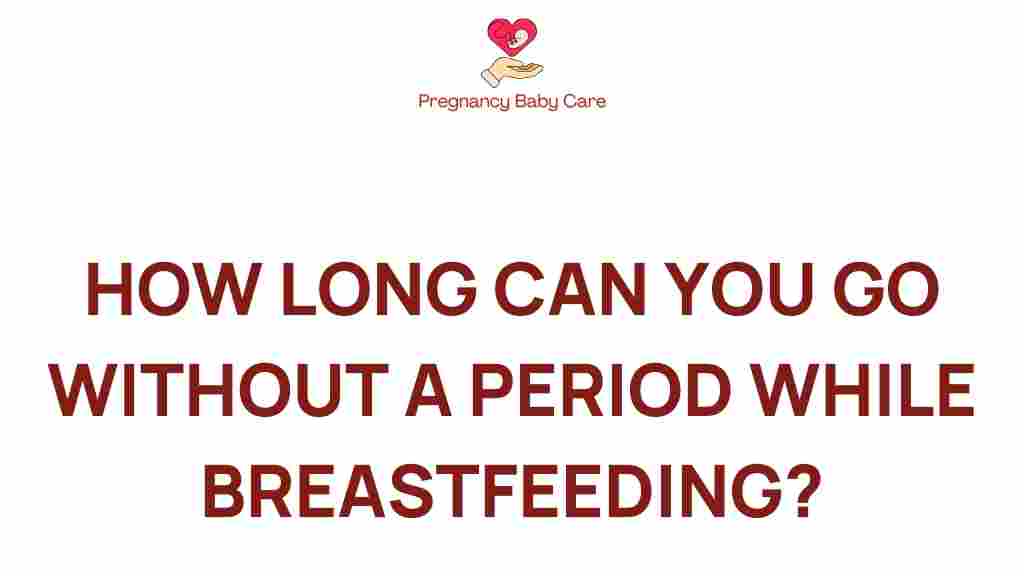The Truth About Breastfeeding: How Long Can You Skip Your Period?
Breastfeeding is a beautiful and natural way to nourish your baby, but it also has significant implications for a mother’s health, particularly regarding her menstrual cycle and fertility. Many new mothers wonder how long they can expect to skip their period while nursing. This article delves into the connection between breastfeeding, the menstrual cycle, postpartum health, and more, helping you understand what to expect during this unique phase of life.
Understanding Breastfeeding and Hormones
Breastfeeding triggers a series of hormonal changes in a woman’s body. The primary hormone involved is prolactin, which is responsible for milk production. High levels of prolactin can suppress ovulation, leading to a delay in the return of your menstrual cycle after childbirth. This natural form of contraception is often referred to as **lactational amenorrhea**.
The Menstrual Cycle Postpartum
After giving birth, your body undergoes a variety of changes as it returns to its pre-pregnancy state. One of the most significant changes involves the menstrual cycle. Here are a few key points to understand:
- Timing of the First Period: For many breastfeeding mothers, the first period may not return for several months, or even longer, depending on the frequency and exclusivity of breastfeeding.
- Exclusive Breastfeeding: If you are exclusively nursing (feeding only breast milk without any formula or solid food), your period may be delayed for an extended period, often up to six months or more.
- Mixed Feeding: If you are supplementing with formula or introducing solid foods, your period may return sooner, often within a few months.
How Long Can You Skip Your Period While Breastfeeding?
The duration for which you can skip your period while breastfeeding varies significantly among women. Factors that influence this include:
- Frequency of Nursing: The more frequently you nurse, the higher your prolactin levels, which can delay your period.
- Nighttime Feedings: Nursing at night can further suppress ovulation and menstruation.
- Individual Hormonal Levels: Every woman’s body is different; some may resume their menstrual cycle sooner than others.
On average, many women find that their period returns between 6 to 12 months postpartum, but others may experience a longer delay.
Impact of Breastfeeding on Fertility
While breastfeeding can suppress ovulation, it is essential to understand that it is not a foolproof method of contraception. You can still become pregnant while nursing, even before your period returns. Here’s what you need to know about breastfeeding and fertility:
- First Ovulation: Ovulation can occur before the first postpartum period, meaning you may not realize you are fertile until it is too late.
- Contraception Options: If you wish to avoid pregnancy while breastfeeding, consider discussing contraceptive options with your healthcare provider.
- Return of Fertility: Once you start to introduce solid foods or reduce the frequency of nursing, your fertility may return more quickly.
Health Considerations During the Postpartum Period
The postpartum period is a crucial time for maternal health. Here are some considerations for mothers who are breastfeeding:
- Nutritional Needs: Ensure you are consuming a balanced diet rich in vitamins and minerals to support both lactation and your recovery.
- Hydration: Drink plenty of fluids, as breastfeeding can increase your thirst.
- Mental Health: Pay attention to your emotional well-being; postpartum depression can affect nursing and overall health.
Common Troubleshooting Tips
While many women successfully navigate breastfeeding and its effects on their menstrual cycle, some may experience challenges. Here are some troubleshooting tips:
- Irregular Periods: If your period is irregular upon its return, consult with a healthcare professional to rule out any underlying issues.
- Low Milk Supply: If you notice a decrease in milk supply, consider increasing nursing frequency or consulting a lactation consultant.
- Emotional Challenges: If you feel overwhelmed, seek support from family, friends, or a counselor specializing in maternal care.
Conclusion
Breastfeeding is a remarkable journey that has profound effects on your body, particularly regarding your menstrual cycle and fertility. Understanding the relationship between breastfeeding, hormonal changes, and your health can help you navigate this period with confidence. While it is common to skip your period for months while nursing, it’s important to recognize that each woman’s experience is unique.
Whether you are exclusively breastfeeding or introducing other foods, stay informed about your body’s signals and consult with healthcare professionals when needed. For more information on maternal care and health during breastfeeding, check out this comprehensive guide.
In summary, embrace the beauty of breastfeeding and the vital role it plays in your postpartum recovery, but also stay aware of how it affects your menstrual cycle and overall fertility.
This article is in the category Health and created by PregnancyBabyCare Team
